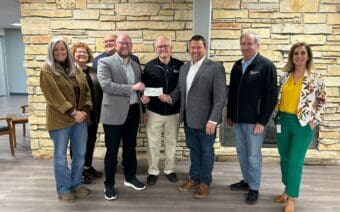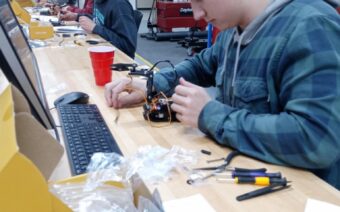
January 12, 2023
SHEBOYGAN – As many in the entrepreneurial sector will tell you, investments in pre- or early-revenue startups are critical components to their success.
Recognizing its importance, the Sheboygan County Economic Development Corporation (SCEDC) launched an accelerator program called the Sheboygan County Accelerator for Learning Entrepreneurship (SCALE), which aims to provide expertise, resources and services to help spur entrepreneurial opportunities in the Sheboygan County region and beyond.
Startup founders will receive funds in the form of grants from the Wisconsin Economic Development Corporation (WEDC).
Also unique to this accelerator is SCEDC’s partnership with Lakeland University, which has developed a 10-week-long curriculum focused on business success.
Ray York, business counselor with the Small Business Development Center at the University of Wisconsin-Green Bay and the Sheboygan County Economic Development Corporation, said the program is best suited for small businesses that are mostly in the idea stage.
“Any founder or entrepreneur should be able to explain why they think their idea is viable,” he said. “How they’re going to move their idea forward, (and) how they’re going to find money to finance their business – those kinds of things.”
York said accelerator businesses can have one or multiple founders and don’t have to be in operation yet.
“But once in operation, it should be able to scale beyond what a small business might be able to – and scale beyond our local community,” he said. “We want it to grow within Sheboygan County, but we want them to be able to sell their products or services beyond Sheboygan County’s borders – maybe nationwide, or even worldwide.”
York said the application process isn’t overly difficult, but many of the questions asked within the application process are things that would end up in a business plan.
“So, they’ll still need to have an idea of what they’re trying to accomplish,” he said.
The details
York said the accelerator program provides selected entrepreneurs with 10 hours of education per week for 10 weeks.
He said they’ll also have four hours of flex-time where they can meet with mentors, coaches and community partners.
“A large part of the education and advancement of their ideas will come from the mentorship of the program,” York said. “We have a database of professionals in the area with specific skill sets who are willing to meet with these individuals to help them further their ideas. That’s another great aspect of the program.”

Ray York
SCALE’s curriculum will utilize a combination of known and proven methodologies and is organized by Stephanie Hoskins, Herbert Kohler & Frank Jacobson (HKFJ) chair of business and entrepreneurship at Lakeland University.
Hoskins said throughout the program, participants will be taught by subject matter experts who have professional experience.
“We’ll touch on a lot of topics, but it’s hard to boil it down to 10 weeks,” she said.
Hoskins said there’s so much to learn about entrepreneurship, which is also ongoing.
“We’re going to try to expose them to all of the topics they’ll need to be aware of,” she said. “As well as the things entrepreneurs need to know within each of those areas.”
In the first week of the program, Hoskins said founders will focus on networking – including how to build out their networks, which also includes working toward developing mentorship pairings and other business-type relationships.
She said other weekly topics will include:
Customer discoveryInsuranceIncorporation processes and other legal issuesWebsite developmentSocial media usageMarketing, promoting and advertisingFundraising and raising capitalSalesBrandingOvercoming challengesIdentifying other business tools and apps for workflow ease
“As a (business) founder, they’re going to face countless challenges,” she said. “So they’ll look at what they would do in different situations, who they’d turn to, and what the various resources are they can lean on to get past the challenges.”
Hoskins said the SCALE program will bring in local experts to lead these discussions.
“That will also help these entrepreneurs build their network at the same time,” she said. “What I wanted to do to differentiate this accelerator from other accelerators was to make sure that for each of the companies we choose, we’re able to find a community partner, which would be a business in the area that can work with them.”
The funds
Hoskins said participants will receive a $5,000 grant to help them advance some of the next steps of their business idea – whether it’s with website development, branding, technology, intellectual property or something else – within the first week of the program.
She said participants will receive an additional $5,000 at the conclusion of the program – noting that none of it has to be repaid.
“The goal at the end of the class is these entrepreneurs will always have a place to go back to to help them work through their idea and keep it moving forward – whether they have a business counselor that can help them, or there are mentors from the program that can help them or it’s the educator of the class that can help them,” York said. “They’ll always have a home base to help them.”
Another end goal of the accelerator, he said, is to get participants ready for that next step – that next journey.
“That would be either to get them ready for an equity-based accelerator – which would be a similar program to what we’re teaching, but that has more investors involved in the program,” he said. “Or have them be ready to get money from angel investors or crowd-investing, or from pre-sales or something along those lines. Our goal is to get them out of this early stage and into that next realm (of their business growth).”
Getting started
York said businesses for SCALE’s first cohort are currently being reviewed by a committee of business and academia professionals.
The top 10-20 ideas selected will move forward in the process.
Those will eventually be narrowed down to six and those businesses will participate in the SCALE accelerator program, beginning Feb. 21.
York said all sessions will be held at Jake’s, A Lakeland Community – a 20,000-square-foot business education and venture facility located at 529 Ontario Ave., which is about 25-30 minutes away from Lakeland’s main campus.
Additional support
York said SCEDC also offers additional support programs and services to help businesses of any size and at any stage.
“We can work with anyone who has a business idea – whether it’s a small business idea, a start-up business idea or whatever,” he said. “We can help a business problem-solve through any (stage) of their business, and we can give them the information they need to make the best-informed decision as they work through it.”
York said there is no charge for any of our services.
More information can be found at sheboygancountyedc.com or by calling (920) 452-2479.
Jake’s – A Lakeland Community
The site of the newly launched Sheboygan County Accelerator for Learning Entrepreneurship (SCALE), Jake’s, A Lakeland Community, located at 529 Ontario Ave., has a history dating back to 1962.
Jake and Betty Jacobson moved their then-five-year-old at-home advertising agency, Jacobson Advertising, to the building.
In 1983, the Jacobsons sold to their son, Tryg, who teamed up with Jon Rost, and rebranded the advertising company as Jacobson Rost.
Stephanie Hoskins, HKFJ chair of business and Entrepreneurship at Lakeland University, said as it grew, the space started as just one building, but eventually became four connected buildings.

Stephanie Hoskins said Jake’s – A Lakeland Community has a history dating back to 1962. Submitted Photo
But, she said, the buildings weren’t all next to each other originally.
“The Jacobsons hand-picked these other buildings from around downtown Sheboygan that, at one time or another, were slated for demolition, and one by one they had them moved to the property where the advertising agency was,” she said.
Hoskins said by sometime in the late 1970s or early 1980s all four buildings – three historic homes and one historic church, all constructed between 1860-1910 – were all connected.
“It’s beautiful, historical and a total maze,” she said.
Eventually, Rost retired and Tryg Jacobson sold his interest in the agency in 2010 to a buyer who unexpectedly moved the business to Milwaukee and Chicago, leaving Tryg with 20,000 feet of empty space at the height of a recession.
Hoskins said thinking outside the box about what to do with the property, Tryg Jacobson ultimately decided to turn it into a creative campus, named in honor of his parents.
Hoskins said Jake’s Café opened its doors in June 2010, designed as a place that attracted and nurtured a community of creative people from all walks of life and with a myriad of talent and business ideas.
Last June, Hoskins said through a series of donations and endowments, Lakeland acquired Jake’s and transitioned it to Jake’s, A Lakeland Community – and created the Herbert Kohler & Frank Jacobson Chair for Business and Entrepreneurship.
“My position at Lakeland is subsidized through an endowment from Mr. Kohler before he passed away,” she said. “My job is to focus specifically on entrepreneurship and innovation. So, I run the programming at Jake’s and also work on building out the entrepreneurship courses, offerings and opportunities for our students at Lakeland, too.”
Hoskins said entrepreneurs can use the space at Jake’s by the hour, day, month or year, which offers rentable office space, conference rooms and a reception area.
“You can rent offices, you can have a dedicated desk, or you can have a flex-desk, which is where you just pay a monthly membership fee and, for that fee, you can come and work from any open space anytime you want,” she said.
Hoskins said the membership fee also includes free, high-speed Wi-Fi, printing capabilities, free coffee and bottles of water, production workspace, A-V equipment, whiteboards, indoor and outdoor meeting spaces and a reception area.
She also said entrepreneurs don’t have to live in Sheboygan County to access programming at Jake’s or to reach out to them with business-related questions.
“Jake’s is backed by Lakeland University, (which) gives us access to a lot of additional programming,” Hoskins said.
 ‘It’s never too late to follow your dreams’
‘It’s never too late to follow your dreams’ Four recognized as 2023 Aurora Health Care Nurses of the Year
Four recognized as 2023 Aurora Health Care Nurses of the Year








